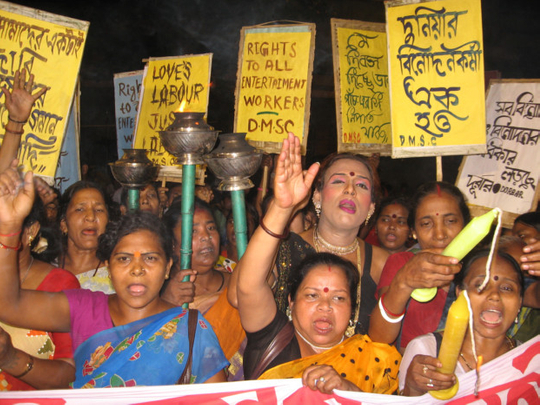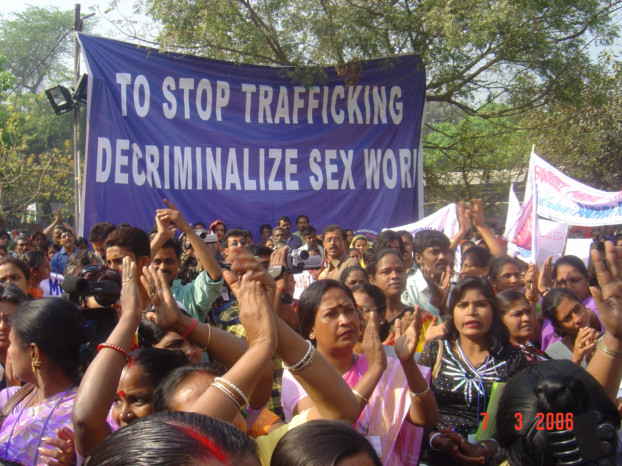
The women of Sonagachi — one of Asia’s largest red-light districts in the eastern Indian city of Kolkata — are used to being treated as second-class citizens by the government. But Rekha Das, a 32-year-old sex worker, dug her heels in and refused to suffer in silence.
Matters came to a head when a state-run school denied admission to Akash, Das’s 6-year-old son, after interviewing him. The headmaster told the doting mother that her child’s IQ did not match his age. But she instinctively knew there was nothing wrong with her son and the problem lay elsewhere — school authorities didn’t want a child from the brothel to “pollute” the classroom filled with boys from respectable families.
Using the Right to Information Act that forces the government to disclose information to citizens, Das demanded to know why her son was refused admission along with the names and designations of those who took the decision.
Rather than disclose the information, Das was called to the school and told to pay the admission fee so that Akash could start attending classes!
It is one of the first victories notched against a callous administration since the launch of a fully fledged RTI centre in Sonagachi on March 3 this year on the occasion of International Sex Worker Rights Day. The new RTI centre is the brainchild of Durbar Mahila Samanwaya Committee (DMSC), or Committee for Indomitable Women, a one-of-its-kind prostitutes’ union whose motto is to empower women engaged in the flesh trade.
DMSC has enlisted the services of leading RTI campaigner, Amitava Choudhury — a charismatic, white-haired, bespectacled former banker — to teach Sonagachi’s sex workers such as Das how to use the provisions of RTI law to fight for their rights and entitlements. The RTI centre is housed in the DMSC office in the heart of Sonagachi.
The RTI Act, which empowers Indians to access information held by the government, came into force in 2005 and is one of the most radical in the whole world. It suddenly opened opaque officialdom to public scrutiny. It has been hailed as a big weapon against corruption, discrimination and sheer bad governance.
The path-breaking legislation lifted the shroud of secrecy which covered virtually every sphere of Indian government activity, making the system more transparent and officials more accountable.
For a princely fee of Rs10 (63 fils), Indians can demand from the government, as a matter of right, information on virtually anything affecting their daily lives.
The landmark legislation came as a boon for marginalised communities that had to wait endlessly for basic things such as birth certificates, water or electricity connections, passports and driving licences or pay a hefty bribe to corrupt officials lying in wait for harassed citizens to approach them.
But RTI is the new alternative to greasing palms and is being increasingly used nationwide by the common man to find out what is delaying his application, and perhaps even more importantly, which government officials are responsible for the inordinate delay.
Significantly, Arvind Kejriwal, founder of Aam Aadmi Party who has become a thorn in the flesh of the Congress Party and the Bharatiya Janata Party alike, won his spurs championing the right to information. Long before his foray into electoral politics, Kejriwal ran Parivartan (Change), a grass-roots movement to popularise freshly minted RTI laws.
In a 2006 interview to the Times of India newspaper, Kejriwal hailed the RTI Act as “revolutionary”, adding: “It has changed the power balance in favour of the people. When someone learns to use RTI, he almost becomes addicted to it. It’s thrilling — it empowers the very ordinary citizen in a tremendous way.”
The idea was first mooted in the 1980s by then prime minister Rajiv Gandhi, who famously said that out of every 100 rupees allocated by the government for the people, only 16 rupees reached them, with the rest going to corrupt politicians and officials. Gandhi’s observation triggered introspection but it took more than two decades for Parliament to pass the RTI Act, in 2005.
Suchi Pande, a prominent RTI activist, says that “the campaign which culminated in the RTI Act began in the early 1990s in rural Rajasthan through the struggles of Mazdoor Kisan Shakti Sangathan — a non-party political organisation fighting on issues of land, minimum wages and delivery of basic services to the poor. They understood that they could not access their services and entitlements without access to the documents that contained proof of corruption and inefficiency, which resulted in the abrogation of their most basic rights.
“In 1995, an ordinary woman, Sushila — she had only studied up to the fourth grade — coined the slogan that now symbolises the RTI movement all over India: ‘Hamara Paisa, Hamara Hisab’ [Our Money, Our Accounts]. Leading Hindi journalist, late Prabhash Joshi, created another defining slogan: ‘Hum Jaanenge, Hum Jeeyenge’ [We will Know, We will Live] deftly linking the right to know to the right to live.”
As disadvantaged communities across India started harnessing the power of RTI after 2005, Samarjit Jana, a Kolkata doctor with a heart of gold, realised that so-called “fallen” women too could reap the benefits of the new law.
To be sure, Dr Jana has had an abiding interest in the plight of the “fallen” women. Stung by the administration’s step-motherly treatment of more than 10,000 sex workers plying their illegal trade daily in Sonagachi, India’s biggest red-light district, he laid the foundations of a guild way back in 1995 to fight for their rights and called it the Durbar Mahila Samanwaya Committee.
Today, on paper, Dr Jana is only the chief adviser of DMSC, whose website describes it as “a forum exclusively managed by sex workers and their children”. But, in reality, he still almost single-handedly steers the collective striving for society’s recognition and respect for sex workers.
The union’s membership has risen to 65,000, comprising female, male and transgender sex workers in Sonagachi and other red-light areas of Kolkata and West Bengal. Although sex workers themselves hold key positions and are in the forefront of the campaign to legalise prostitution, Dr Jana has the last word in the globally acknowledged outfit.
A lot of conservative Indians hold prostitutes in utter contempt as carriers of infectious diseases. India’s more-than-three-million sex workers, including 1.3 million child prostitutes trafficked from the poorest parts of the country, lead an ostracised existence in red-light ghettoes of metropolitan cities and towns.
Dr Jana told Weekend Review: “We had long felt a crying need for an RTI centre in Sonagachi to help sex workers claim what’s rightfully theirs from a heartless administration oppressing them.”
Bharati Dey, a former sex worker who is now DMSC secretary, added: “Among disadvantaged classes, sex workers are probably the most vulnerable because of the stigma attached to their profession. They are discriminated against at every step. Things which other citizens take for granted — ration cards, below-poverty-line [BPL] cards, PAN [Permanent Account Number] cards, voter identity cards — are systematically denied to them.
“Police and civic officials treat them like dirt. Government schools and hospitals shoo sex workers and their dependants away on some pretext or the other.
“We want our members to use RTI Act to find out what their entitlements are as citizens and sue the government in case of discrimination. DMSC is grateful to Amitava Choudhury, who is well-versed in RTI laws, for volunteering to teach our members exactly how to ferret out information affecting their lives from various government departments.”
Dey showed Weekend Review an RTI application she filed on behalf of DMSC before the Child Welfare Committee (CWC) of West Bengal government soon after the RTI centre was launched. Pinky Tamang, a sex worker and DMSC member, was picked up by the police from the Burtolla red-light area in Kolkata on the charge that she was a minor and handed her to CWC for counselling and rehabilitation.
DMSC vehemently opposes the entry of girls below 18 into prostitution and ascertains a new entrant’s age before granting her membership. The group has in place what it calls a Self Regulatory Board (SRB) for the purpose. But the police, which has an axe to grind, doesn’t recognise SRB certification.
Resorting to RTI, Dey has demanded to know the result of an ossification test CWC is bound by law to conduct on Tamang to establish her age. If the information is not disclosed within a specific period stipulated by the RTI Act, Dey will file an appeal.
Choudhury, 61, says that he became interested in the right to information as a trade unionist in Indian Bank. Long before RTI Act became a reality, Choudhury became an active member of the National Campaign for People’s Right to Information (NCPRI) which piled pressure on the government to enact the path-breaking law.
“The poorer and less privileged you are, the more dependent you are on the government for everything — water, subsidised food, electricity, education, employment and medical facilities. And sex workers are truly disadvantaged in that sense. They are ill-treated by all government departments and shamelessly denied their rights,” Choudhury said.
At RTI awareness workshops in Sonagachi, Choudhury stages a play which shows a sex worker being evicted from a government hospital after it is discovered that she is HIV-positive. With nowhere to go, she cries at the hospital gate, attracting the attention of an RTI activist. When she tells him the truth, he takes her to the hospital superintendent, who claims that there is an official circular prohibiting treatment of HIV-positive patients but refuses to show the circular.
Next the RTI activist demands to know from the health department whether such a circular exists. Armed with the written reply, they confront the hospital superintendent who is compelled to resume the sex worker’s medical treatment. But the play progresses beyond that with the superintendent seeking the RTI activist’s help to solve the water-logging problem outside his residence!
The activist helps the superintendent use the RTI Act to corner the Kolkata Municipal Corporation engineer responsible for the flooding around his home. The engineer has no option but to own up and solve the problem. The engineer then persuades the activist to use RTI to find out what is delaying the mutation [change of ownership in the records of the local municipal body] of his property, and which official was responsible.
“The women clap each time the RTI activist triumphs in the play. Their applause shows that the drama’s message has hit home, and that as victims of government’s apathy themselves, they consider RTI laws a godsend,” Choudhury says.
“The Act is pretty straightforward”, he adds. “I explain all the 31 sections to them for a broad understanding of what the law is all about. But there are only five core, operative sections on which such a powerful Act rests.”
An ability to think on its feet is vital for an outfit like DMSC. Last year, it started training members to identify counterfeit currency that some customers were conning them with in their dimly lit brothels. “Most of them only came to know that they have been deceived when they went to deposit their earnings at the bank,” said Dr Jana, who roped in experts to teach them how to distinguish between real and fake currency notes.
Significantly, Sonagachi’s unionised sex workers insist on customers using condoms, reducing infection rates to between 5 and 10 per cent, compared to nearly 50 per cent in Mumbai’s Kamathipura brothels.
But DMSC’s latest, no-holds-barred campaign to spread awareness about a relatively new law among practitioners of one of the world’s oldest professions could well prove to be the biggest game-changer of all.
S.N.M. Abdi is a noted Indian journalist and commentator.













